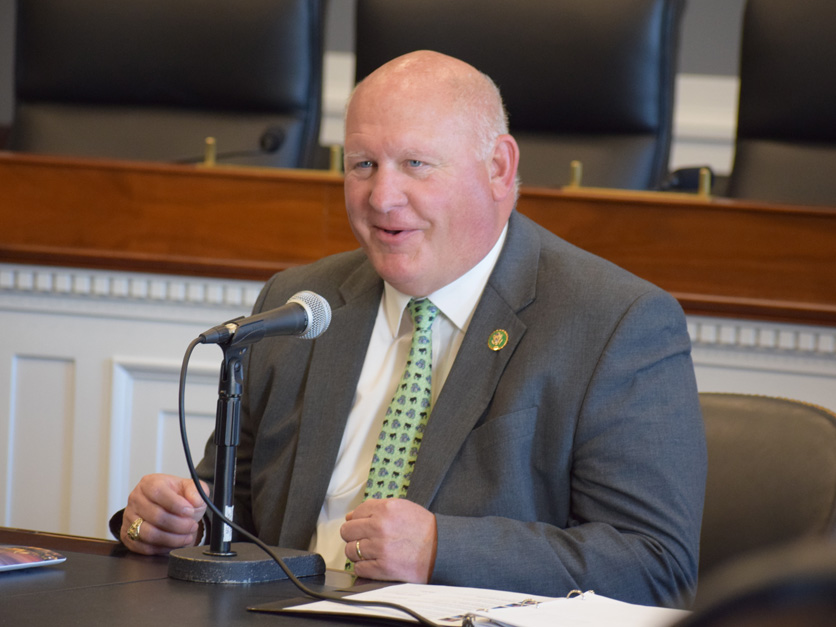Farm labor reform has virtually no chance of going anywhere, but that doesn’t mean there won’t be action on the workforce concerns. Many in the ag sector have turned to the farm bill to get help with automating many jobs, and a House Ag Committee task force plans to do an in-depth study of labor issues in the coming months.
Committee Chairman Glenn “GT” Thompson, R-Pa., told Agri-Pulse on May 1 that he plans to formally announce the task force later this month, and in various interviews in recent days, he’s shared that the bipartisan group will be given six months to develop proposals for how to address ag workforce issues. He intends to then use the task force findings to develop a bill.
Thompson is taking advantage of new House rules that allow the Ag Committee to form a task force in addition to having six subcommittees.
The task force is going to “do the heavy lifting of figuring out what would provide us the best food security through a reliable workforce,” Thompson said.
The Ag Committee doesn’t have jurisdiction over immigration policy — that’s the responsibility of the Judiciary Committee, so any legislation the House Ag produces is likely to be symbolic. Thompson said his ultimate goal is to develop a bill that the Ag Committee and the ag sector can “rally around.” “Then from there, we'll see what happens,” he said.
 House Ag Committee Chair Glenn "GT" Thompson, R-Pa.
House Ag Committee Chair Glenn "GT" Thompson, R-Pa.Still, California Rep. Jim Costa, a longtime Democrat on the committee, said the task force could be helpful in getting Republicans “engaged” on workforce issues. “It could be a positive thing if it got the right makeup, profile and is truly bipartisan.”
Washington GOP Rep. Dan Newhouse won’t be on the task force, since it is limited to Ag Committee members, but he told Agri-Pulse “more voices talking about one of the biggest issues facing not only agriculture but a lot of other industries … is great."
Farm groups’ best chance in recent years of enacting farm labor reform, including expanding the H-2A program, evaporated when the Farm Workforce Modernization Act, passed twice by a Democratic-controlled House, died in the Senate at the end of the last Congress. Newhouse was the lead Republican on that bill during each attempt to move the legislation.
Now, Republicans are in charge of the House, and a similar bill that would provide a path to legal status for farmworkers who are now in the country illegally would have no chance of passing that chamber.
In fact, a GOP border security bill that the House passed last week illustrated the challenge for the ag sector: Farm groups say the bill could worsen ag labor challenges because the measure would require all employers to use the E-Verify system to check the legal status of employees.
“We’ve got kids here who’ve grown up in America, and that E-Verify component would’ve kept them from being able to work in America,” said California Rep. John Duarte, a House Ag Committee member who was one of just two Republicans who voted against the border bill.
Don’t miss a beat! It’s easy to sign up for a FREE month of Agri-Pulse news! For the latest on what’s happening in Washington, D.C. and around the country in agriculture, just click here.
He welcomes Thompson’s task force. “I’m very interested in a broader immigration and border bill that solves some of the ag labor problems and actually gives us a strategy that lets our food producers and rural producers meet their labor needs," he said.
Farm groups are counting on the task force to at least keep the spotlight on ag labor issues.
Sara Neagu-Reed, director of advocacy and government affairs for AmericanHort, which represents greenhouse growers, says the task force could help build the case for a top farm bill priority for the specialty crop sector – a new stand-alone research program for automation.
AmericanHort and other groups that are members of the Specialty Crop Farm Bill Alliance are trying to get $20 million a year included in the next farm bill for the program.
“It's just alarming to me that this doesn't exist yet given the labor challenges we've been dealing with for how many decades,” Neagu-Reed said. She said congressional offices as well as leaders of the House and Senate Ag committees have been receptive to the idea.
Farm groups argue a stand-alone program is needed to make sure automation doesn’t lose out to competing priorities in existing research programs.
“I just don't think we can wait and sit around another farm bill” to get the funding, she said. “This should have been done years ago.”
 Sara Neagu-Reed, AmericanHort
Sara Neagu-Reed, AmericanHortChuck Conner, president and CEO of the National Council of Farmer Cooperatives, said farm groups have a good case to make for automation assistance, given the lack of congressional action on immigration policy. He doesn’t think an ag labor bill can pass until Republicans are satisfied that the border is secure.
Automation funding avoids the political baggage of an immigration bill. The biggest challenge is finding the necessary funding in the farm bill, he said. “It boils down to what money is available and how they allocate it."
Conner said the benefit of Thompson’s task force is that it will continue to “shed light" on the labor challenges facing farmers.
“My experience with GT Thompson is that he’s more of a doer than a talker,” Conner said. “By putting this group together … the intent to try and help pave the way for action in Congress to address the issues. I’m hoping that’s the case here.”
For more news, go to Agri-Pulse.com.


